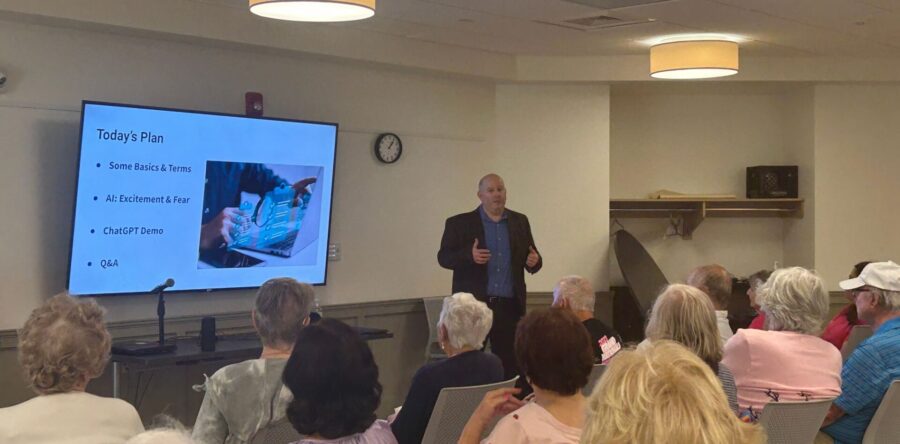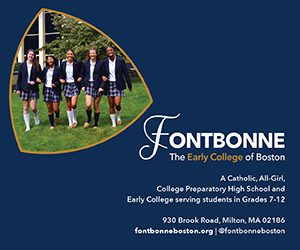By Julia Beauregard
Hometown Weekly Editor
Recently, at the Walpole Council on Aging (COA), as part of their weekly Coffee and Conversations program, the COA organized a lecture on Artificial Intelligence, commonly referred to as AI. The lecture was delivered by Michael Fradkin, a Product Marketing Specialist.
"I believe this might be our most popular Coffee and Conversation event yet!" COA Director Kerri McManama exclaimed. The room was filled with seniors eager to delve into the world of AI.
The lecture encompassed the following elements: an introduction to fundamental AI terminology, an exploration of the emotions surrounding the emergence of this technology, a demonstration of ChatGPT, a freely available AI resource, and a question-and-answer session at the conclusion of the presentation.
With over three decades of experience in the technology industry, Fradkin discussed how artificial intelligence is poised to be a groundbreaking force for the future. He expressed, "I am both excited and concerned about AI."
The presentation commenced with a discussion by the presenter on the distinctions between Narrow AI, which solves specific problems, and General AI, which seeks to emulate human cognitive abilities. Narrow AI, as explained, is exemplified by chatbots on websites addressing specific issues, while General AI possesses a broader range of applications. Fradkin proceeded to share a video with attendees, highlighting AI controversies, including the creation of artwork and music by artificial intelligence, sparking debates over whether these creations can be considered true art. Additionally, a video on AI companionship, featuring AI home health aides and advancements in the medical field, was presented. Fradkin remarked, "It's a complex issue, both unsettling and fascinating." On one hand, AI holds potential to support and advance medical research, while on the other, it could replace a significant portion of job opportunities.
These revelations raised concerns among the seniors, with many expressing discomfort and reluctance toward relying on AI-generated home health aids, despite their convenience.
"Those deeply involved in AI have witnessed its immense power, causing some to call for caution," Fradkin shared. He emphasized the commitment of AI insiders to ensure that these tools are used for the greater good. Nonetheless, there are numerous concerns related to the potential threats posed by AI, including job displacement, privacy and copyright issues, accountability gaps, erosion of human skills, misinformation, ethical dilemmas, bias, and the emergence of deep fakes and synthetic realities. AI undeniably possesses the potential to reshape our lives. Fradkin mentioned that CEOs have advocated for government regulations due to the immense power of AI.
Conversely, many people are enthusiastic about the positive applications of AI. It can enhance job efficiency and productivity, identify dangerous patterns, contribute to research on degenerative diseases and potential cures, facilitate autonomous transportation, and serve as digital assistants, among other beneficial functions. "There's significant potential for good, provided we can mitigate the risks," Fradkin asserted.
Following the presentation, Fradkin opened the floor to questions before the ChatGPT demonstration. Several seniors shared their apprehensions. One senior stated, "I'm both apprehensive and relieved that major corporations are advocating caution." This led to a discussion on the need for regulations. What type of regulations should be established? How can a consensus be reached on the scope of AI regulation? Should it be governed on a national or international level?
Artificial intelligence, simultaneously thrilling and daunting, stands as one of the most profound creations in our history. We are left to ponder how AI will leave its indelible mark on our world.


























